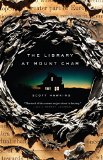Summary | Excerpt | Reviews | Beyond the Book | Readalikes | Genres & Themes | Author Bio

A mile or so later she came to the hollow tree where she had stashed her robe. She shook the bark out of it and picked it clean as best she could. She saved a scrap of the bloody dress for David and tossed the rest, then wrapped herself in the robe, pulling the hood over her head. She had been fond of the dress—silk felt good—but the rough cotton of the robe comforted her. It was familiar, and all she really cared to know of clothing.
She set out deeper into the forest. The stones under the leaves and pine straw felt right against the soles of her feet, scratching an itch she hadn't known she felt. Just around the next ridge, she thought. Garrison Oaks. She wanted to burn the whole place to ashes but, at the same time, it would be kind of nice to see it again.
Home
ii
carolyn and the rest were not born librarians. Once upon a time—it seemed long ago—they had been very American indeed. She remembered that, a little—there was something called The Bionic Woman and another something called Reese's Peanut Butter Cups. But one summer day when Carolyn was about eight, Father's enemies moved against him. Father survived, as did Carolyn and a handful of other children. Their parents did not.
She remembered the way Father's voice came to her through black smoke that smelled like melting asphalt, how the deep crater where their houses had been glowed dull orange behind him as he spoke.
"You are Pelapi now," Father said. "It is an old word. It means something like 'librarian' and something like 'pupil.' I will take you into my house. I will raise you in the old ways, as I myself was raised. I will teach you the things I have learned."
He did not ask what they wanted.
Carolyn, not ungrateful, did her best at first. Her mom and dad were gone, gone. She understood that. Father was all that she had now, and at first it seemed that he didn't ask so much. Father's home was different, though. Instead of candy and television there were shadows and ancient books, handwritten on thick parchment. They came to understand that Father had lived for a very long time. More, over the course of this long life, he had mastered the crafting of wonders. He could call down lightning, or stop time. Stones spoke to him by name. The theory and practice of these crafts were organized into twelve catalogs—one for each child, as it happened. All he asked was that they be diligent about their studies.
Carolyn's first clue as to what this actually meant came a few weeks later. She was studying at one of the lamplit kiosks scattered here and there around the jade floor of the Library. Margaret, then aged about nine, sprinted out from the towering, shadowy shelves of the gray catalog. She was shrieking. Blind with terror, she tripped over an end table and skidded to a stop almost at Carolyn's feet. Carolyn motioned her under her desk to hide.
Margaret trembled in the shadows for ten minutes or so. Carolyn hissed questions at her, but she wouldn't speak, perhaps could not. But Margaret's tears were streaked with blood, and when Father pulled her back into the stacks she wet herself. That was answer enough. Carolyn sometimes thought of how the hot ammonia of Margaret's urine blended with the dusty smell of old books, how her screams echoed down the stacks. It was in that moment that she first began to understand.
Carolyn's own catalog was more dull than terrifying. Father assigned her to the study of languages, and for almost a year she waded through her primers faithfully. But the routine bored her. In the first summer of her training, when she was nine years old, she went to Father and stamped her foot. "No more!" she said. "I have read enough books. I know enough words. I want to be outside."
The other children cringed back from the look on Father's face. As promised, he was raising them as he himself had been raised. Most of them—Carolyn included—already had a few scars.
Excerpted from The Library at Mount Char by Scott Hawkins. Copyright © 2015 by Scott Hawkins. Excerpted by permission of Crown. All rights reserved. No part of this excerpt may be reproduced or reprinted without permission in writing from the publisher.
Your guide toexceptional books
BookBrowse seeks out and recommends the best in contemporary fiction and nonfiction—books that not only engage and entertain but also deepen our understanding of ourselves and the world around us.